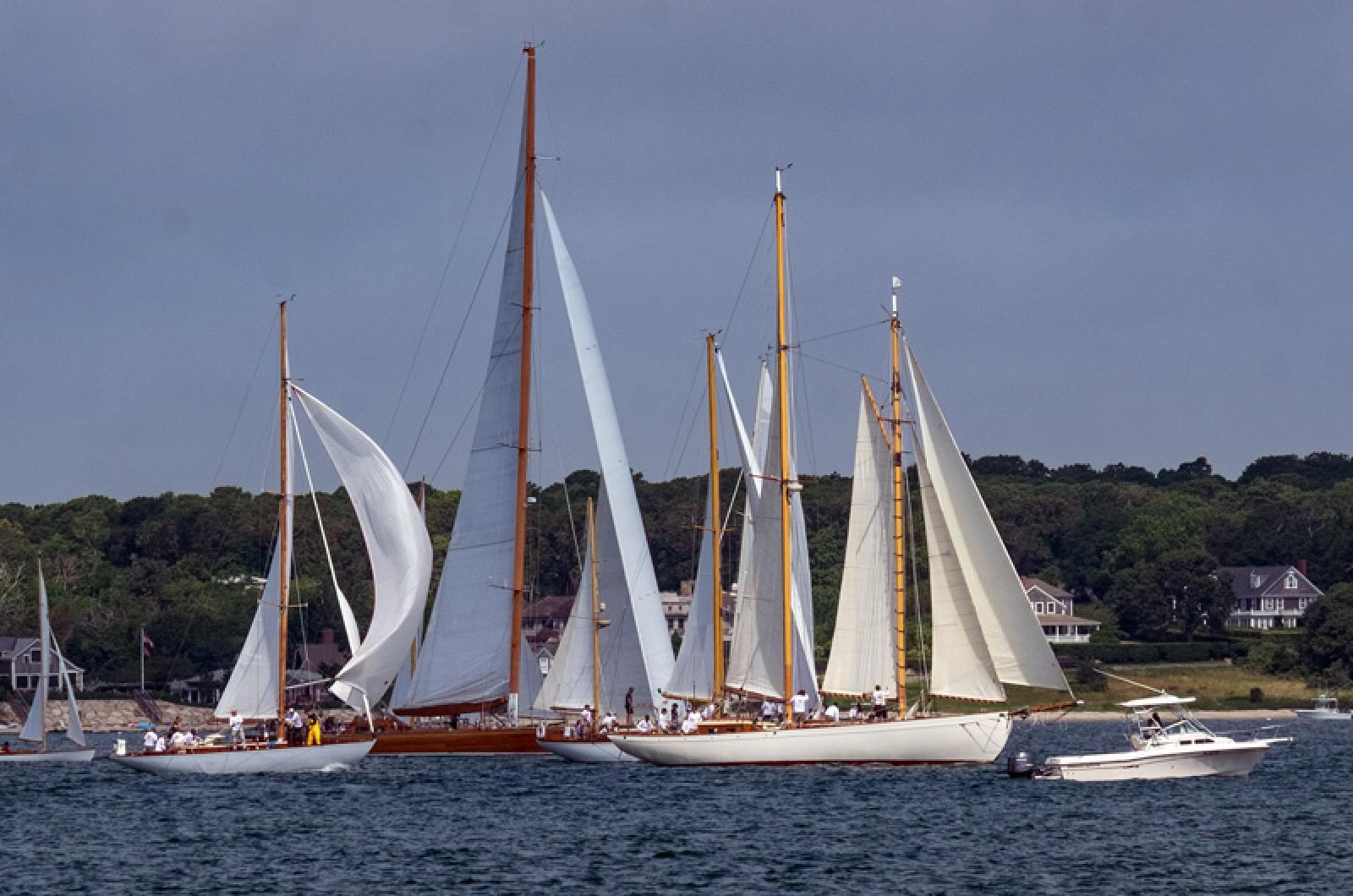The 13th annual Vineyard Cup regatta gets underway this week in Vineyard Haven with a fundraising gala on Thursday followed by three days of racing on Friday, Saturday and Sunday. Each race day concludes with a dinner and party.
There will be daring maneuvers at the starts, winning navigational strategies executed on the courses and perhaps even a few photo finishes at the end.
But perhaps the most remarkable feature of the four-day event is the amount of waste it produces — or does not produce.
Four years ago organizers hauled away nearly five tons of trash after the event. This year, after feeding hundreds of sailors each night, sponsor Sail Martha’s Vineyard will pack all the waste it produces into a small cardboard box.
“The metric last year and the year before was down to two cubic feet,” said Sail MV director of sustainability Kimberly Ulmer. “About five pounds of trash. I think we’ve got it down as low as we can go.”
All other waste from the event will be returned, reused, recycled or composted.
Brock Callen, who retires this year as program director for Sail MV and will receive the Cronkite award along with his wife Hope Callen, began the effort to reduce waste four years ago. He credits the idea to his son, who is an ambassador for 11th Hour Racing, an organization the promotes sustainable practices in the sailing community.
“The idea really was to drive down our carbon footprint and show that an event this size, this scale, with this diverse a group attending, could actually accomplish something specific, and something we could measure at the end of the day,” Mr. Callen said. “We live on an Island, and it’s on all of us to make sure nothing goes on the ground, because if it goes on the ground it ends up in the sea, directly or indirectly.”
One key to reducing waste is sorting it before it gets thrown out. Sailors at the Vineyard Cup won’t see trash cans in numerous locations at the dinner and the after race events. Instead, they will see one central waste station with four receptacles.
“One is for compost, for food,” said Ms. Ulmer. “One is for reusable items like a china plate and a fork and a glass that’s going to get washed and reused the next year. One is for returnables, beer bottles and what not. The last one is for landfill-bound trash.”
The compost gets trucked to local farms. The Martha’s Vineyard Regional High School sailing team hauls all the returnable bottles to a recycling station, and keeps the bottle fees to help fund their program. What very little is left goes to the landfill.
Island farms contribute to reducing waste in another key way. The event sources much of its food locally, and has figured out novel ways to avoid wasteful packaging.
Take lettuce, for instance.
“Being on an Island and having a strong agricultural community allows us to go to the farm and get lettuces without packaging,” Ms. Ulmer said. “Packaging is often what produces the most waste. That’s a key way of reducing the waste. Sourcing everything locally reduces your carbon footprint as well.”
When Mr. Callen first began efforts to reduce waste, he found one of the things that could not be recycled or reused was the plastic bags used to package ice. So in following years, organizers figured out how to get much of their ice dumped into coolers directly from the supplier, eliminating most of the plastic bags.
Switching from disposable cups, plates and napkins to china plates, glassware, and silverware was another a key decision.
Ms. Ulmer said after four years of promoting the zero waste mantra, the amount of work and the cost of handling trash has been reduced.
“It was probably more work the first go around, to train people and get everybody’s mind to understand what the new practice is,” she said. “The initial effort was more, but you pay to have your trash removed, so the cost is reduced. The sailors that attend the event are into it, because they know our oceans are struggling. They’re happy to help.”
Word is spreading. Ms. Ulmer now helps several other organizations on the Island reduce waste.
“I hope that more organizations throwing events will want to take on this challenge,” she said.
Not only on the Island, but across the United States, sailing regattas are taking up the cause, according to Mr. Callen. Last year, the Vineyard Cup was one of two events awarded a platinum award from Sailors for the Sea, a marine environmental organization.
While it is unusual for a community sailing organization to devote its resources to sustainability, Ms. Ulmer said it makes sense for sailors to lead the way in protecting the world’s oceans.
“As a marine organization and as sailors, plastic debris is one of the biggest problems in our oceans,” Ms. Ulmer said. “Sailors that sail these around-the-world races and are in the farthest reaches of the ocean, there’s not a lot of human activity, yet you find plastic debris floating around. As mariners, we should be ocean stewards. Especially if you work on the water, recreate on the water, live on the water, you should be thinking about the health of our oceans.”







Comments (2)
Comments
Comment policy »